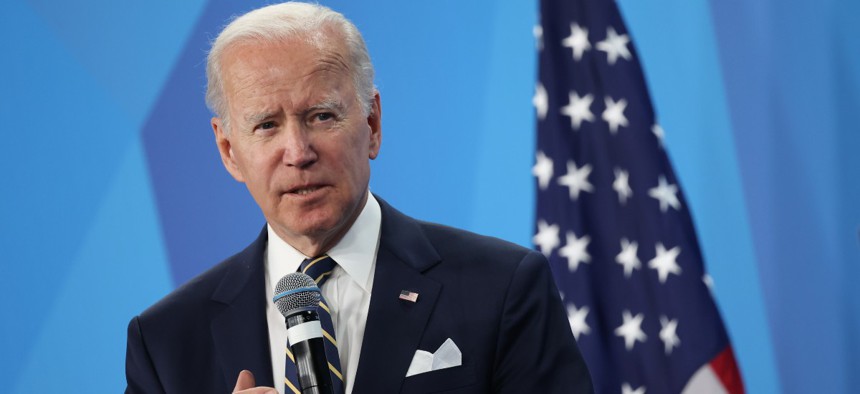Biden Calls for Filibuster Override to Protect Privacy After Roe v. Wade Reversal

President of the United States Joe Biden during the press conference on the final day of the NATO Summit in Madrid, Spain on June 30, 2022. Jakub Porzycki/NurPhoto via Getty Images
How the Supreme Court’s decision on abortion could lead to the codification of an actual right to privacy and a whole lot more. Success may require voting in midterm elections.
President Joe Biden probably wasn’t thinking about the American Data Privacy and Protection Act or any other specific legislation proposed for improving information security when—in response to the Supreme Court’s recent ruling on abortion—he supported ending a Senate filibuster with a simple Democratic majority, instead of the current 60 votes necessary.
“The first and foremost thing you should do is make it clear how outrageous this decision was, how much it impacts not just on the woman’s right to choose—which is a critical, critical piece—but on privacy generally, on privacy generally,” he stressed to a reporter during a press conference before leaving the North American Treaty Organization summit in Spain Thursday. “I believe we have to codify Roe v. Wade in the law, and the way to do that is to make sure the Congress votes to do that. And if the filibuster gets in the way, just like voting rights, we provide an exception for this, or an exception to the filibuster for this action.”
When another reporter informed the president that he was making news by saying the Senate should bypass the filibuster to codify abortion rights, Biden reiterated the move—sometimes referred to as “the nuclear option,”—would be warranted to protect: “the right to privacy, not just abortion rights, but yes, abortion rights.”
Democrats in Congress and other observers of privacy and cybersecurity policy implementation have been connecting the court's overruling of Roe v. Wade to a need to enforce clear rules for tech companies sharing information that governments or vigilantes could use against women seeking procedures in states where the decision has now triggered anti-abortion laws.
But the court’s decision struck a much deeper chord with Biden, one which reverberates far beyond lawmakers’ attempts to craft tech-focused privacy rules.
As with abortion, there is no explicit right to privacy listed in the U.S. Constitution. Related protections—including for activities like marriage and voting—have emerged through precedent, bolstered by constitutional amendments 14 and 9. The Fourteenth Amendment grants a sort of lowest-common-denominator right, preventing states from depriving “any person of life, liberty or property, without due process,” for example. And the Ninth Amendment sought to clarify that Americans shouldn’t view their rights as being limited to those expressly laid out in the bill of rights.
According to a New York University constitutional law scholar interviewed by PBS News, the Supreme Court decision essentially asserts that such unenumerated rights will only be honored if they are entrenched in U.S. “history and tradition.” And that doesn’t bode well for issues like same sex marriage, for starters, but it also opens the door for further government intrusion into the private sphere, in general.
“I really think that it's a serious, serious problem that the court has thrust upon the United States, not just in terms of the right to choose, but in terms of the right to who you can marry, the right to a whole range of issues related to privacy. And I have written, way back, a number of law review articles about the Ninth Amendment and the Fourteenth Amendment and why privacy is considered as part of a constitutional guarantee,” Biden said. “They've just wiped it all out.”
Biden has prioritized protection of the Ninth Amendment and unenumerated rights in his scrutiny of pending Supreme Court justices at various points throughout his career, including during his campaign for the presidency. The Roe v. Wade reversal, and the president’s vocal support for a suspension of the filibuster to address its sweeping implications, could prompt other key democrats such as Senate Majority Leader Charles Schumer to change the Senate rules. But supporters of the president’s call could find they’re still two votes short, as Democrats Joe Manchin, D-W.V., and Kyrsten Sinema, D- Ariz., have signaled resistance to overriding the filibuster.
Biden said upcoming elections in November—where 34 out of 100 senators will be voted into office for a new term—are an opportunity to escape the dynamic that has had much of his agenda in a holding pattern since his inauguration.
“I'm gonna do everything in my power, which I legally can do in terms of executive orders, as well as pushing the Congress and the public,” he said. “The bottom line here is … if you think this decision by the court was an outrage or a significant mistake, vote, show up and vote. Vote in the off year and vote, vote, vote. That's how we'll change it.”
NEXT STORY: House Lawmakers Introduce CHIPPING IN Act






